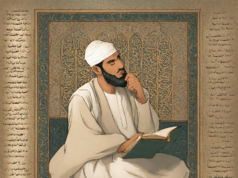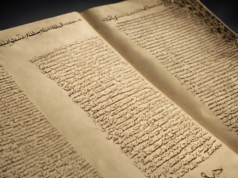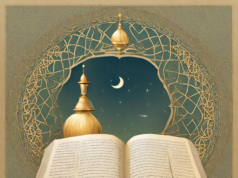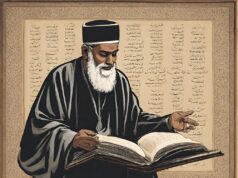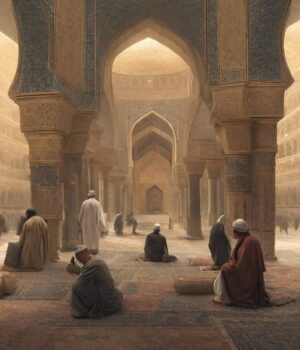
A study into both Quranic and other textual sources to determine if the Prophet(s) and the Aimmah (as) had been given knowledge of the unseen.
This article will cover the Quranic evidences, while Part 2 covers the other textual sources (narrations and scholarly opinions).
We have seen how thousands of narrations were fabricated by different groups (see article here) and inserted into the books of the companions of our Imams (as), let us take a look at how these false beliefs openly and clearly contradict the Quran.
At this point we remind the readers about the instruction of Imam al Ridha (as) where he says: …You should not accept any hadith that is attributed to us if it is in conflict with the Quran because whatever we say is in harmony with the Quran and Sunnah of the Prophet (s) as we only narrate from God and his messenger.” (Rijal Kashi)
Imam Sadiq (as) says: “Do not accept any narration except that which is in line with the Quran and Sunnah, or what you find in the narrations of the previous Imams (as), because Mughira bin Sa’eed, may curse of Allah be on him, inserted such narrations in the books of the companions of my father (Imam Baqir (as)) which he (as) had never said…..” (Rijal Kashi)
You should not accept any hadith that is attributed to us if it is in conflict with the Quran because whatever we say is in harmony with the Quran and Sunnah of the Prophet (s)
Imam Ali-Ridha (as)
First let us state what the present day general Shia belief is regarding the knowledge of Prophet (saww) and the Imams (as).
Most Twelver Shias believe that the Prophet (s) and Imams (as) have full knowledge of everything from the past and future, from the time they are born, to be precise, not just since they are born, rather since much before that. It is also believed that the Prophet (s) and Imams (as) were already aware of the Quran, even before it was revealed, and a popular incident is repeatedly narrated in religious lectures, which says that when Imams Ali (as) was born and was in the arms of the Prophet (saww) he recited the whole Quran (even though the Quran had not been revealed at that time.)
What does the Quran Say?
Verse 1: After narrating the story of Prophet Nuh (as), Allah (swt) says to Prophet Muhammad (saww):
تِلْكَ مِنْ أَنبَاءِ الْغَيْبِ نُوحِيهَا إِلَيْكَ ۖ مَا كُنتَ تَعْلَمُهَا أَنتَ وَلَا قَوْمُكَ مِن قَبْلِ هَٰذَا ۖ فَاصْبِرْ ۖ إِنَّ الْعَاقِبَةَ لِلْمُتَّقِينَ
That is from the news of the unseen which We reveal to you, [O Muhammad]. You knew it not, neither you nor your people, before this. So be patient; indeed, the [best] outcome is for the righteous. (Quran, 11:49)
This is such a clear verse, Allah (swt) is clearly saying that Rasulallah (saww) did not know about this (events of Nuh (as)) before it was revealed to him in the Quran. Allah (swt) makes it crystal clear by adding “..neither you nor your people, before this”.
Bearing in mind that those wishing to play with the verse would have been able to twist the meaning of verses to suit their beliefs, if the verse had only said “..You (oh Prophet) did not know this..”, then they could have claimed that this verse is talking about Alam e Dharr, or Alam al arwah, even before Adam was created; meaning, that is the time when Allah (swt) revealed to our Prophet (saww) the story of Nooh. Well Allah (swt) clarified it by saying “..neither you nor your people..” knew it “BEFORE THIS..,” which clearly shows that Allah (swt) is talking about this world, not some other realm.
This clearly proves that the Prophet (saww) does not know everything from the past (like story of Nuh (as)), and this also proves that the Prophet (saww) was not even aware of the Quran before it was revealed to him in this world.
Verse 2: Allah (swt) instructs the Prophet (s) to say to the people:
قُلْ هُوَ نَبَأٌ عَظِيمٌ
مَا كَانَ لِيَ مِنْ عِلْمٍ بِالْمَلَإِ الْأَعْلَىٰ إِذْ يَخْتَصِمُونَ
إِن يُوحَىٰ إِلَيَّ إِلَّا أَنَّمَا أَنَا نَذِيرٌ مُّبِينٌ
Say, “It is great news from which you turn away.
I had no knowledge of the exalted assembly [of angels] when they were disputing [the creation of Adam].
It has not been revealed to me except that I am a clear warner.” (Quran, 38:67-70)
Mala e A’ala, according to most Mufassireen refers to the incident when Angels were asked to Prostrate in front of Adam (as), and there was a controversy. Irrespective of what it means, one thing is clear, that the Prophet (saww) was not aware of “Mala e A’ala” when it took place, even though according to popular belief, the Prophet (saww) was created much before Adam (as), so he (saww) should have witnessed whatever happened in Mala e A’ala.
Verse 3: Allah (swt) says to Rasulallah(s)
وَمِمَّنْ حَوْلَكُم مِّنَ الْأَعْرَابِ مُنَافِقُونَ ۖ وَمِنْ أَهْلِ الْمَدِينَةِ ۖ مَرَدُوا عَلَى النِّفَاقِ لَا تَعْلَمُهُمْ ۖ نَحْنُ نَعْلَمُهُمْ ۚ سَنُعَذِّبُهُم مَّرَّتَيْنِ ثُمَّ يُرَدُّونَ إِلَىٰ عَذَابٍ عَظِيمٍ
And among those around you of the Bedouins are hypocrites, and [also] from the people of Madinah. They have become accustomed to hypocrisy. You, [O Muhammad], do not know them, [but] We know them. We will punish them twice [in this world]; then they will be returned to a great punishment. (Quran, 9:101)
Not just past and future. Just like any human, the Prophet (s) is told that he is unaware who the hypocrites are from within the people of his city. Which is why Allah (swt) says “You do not know them…”.
Verse 4: Before narrating the story of Prophet Yusuf (as), Allah says to Rasulallah (s):
نَحْنُ نَقُصُّ عَلَيْكَ أَحْسَنَ الْقَصَصِ بِمَا أَوْحَيْنَا إِلَيْكَ هَٰذَا الْقُرْآنَ وَإِن كُنتَ مِن قَبْلِهِ لَمِنَ الْغَافِلِينَ
We relate to you, [O Muhammad], the best of stories in what We have revealed to you of this Qur’an although you were, before it, among the unaware. (Quran, 12:3)
An argument is made that the word “ghaafil” does not mean “unaware” rather it means that Rasulallah (saww) was aware, but did not tell the people. If we assume that Rasulallah (saww) knew everything, then Nauzobillah even when he died he was ghaafil, because he did not tell the people all that he knew in his life. This is clearly illogical.
Also see 6:131, 6:156, 7:172 etc where word ghaafil is used for being “unaware”
Verse 5: Allah (swt) asks Rasulallah (s) to say to his people:
قُلْ مَا كُنتُ بِدْعًا مِّنَ الرُّسُلِ وَمَا أَدْرِي مَا يُفْعَلُ بِي وَلَا بِكُمْ ۖ إِنْ أَتَّبِعُ إِلَّا مَا يُوحَىٰ إِلَيَّ وَمَا أَنَا إِلَّا نَذِيرٌ مُّبِينٌ
Say, “I am not something new among the messengers, nor do I know what will be done with me or with you. I only follow that which is revealed to me, and I am not but a clear warner.” (Quran, 46:9)
Some people argue that: “What will be done with me and you” is talking about Day of Judgment, and that is not included in Ilm al Ghayb, rather everything that happens before the Day of Judgment is included in Ilm al Ghayb.
This is against what Imam Ali (as) has been quoted to have said in Nahjul Balagha, Sermon 128. While Imam Ali (as) was informing the people of certain future events, a person from the tribe of Kalb stood up and said “O Amir al-mu’minin, you have been given knowledge of Ghayb. (Because this companion was thinking, if the Imam doesn’t have Ilmul Ghayb, then how can he tell us about these future events, but the Imam corrected him as follows:
Whereupon Amir al-mu’minin (as) laughed and said to the man who belonged to the tribe of Banu Kalb:
“O brother of Kalb! This is not knowledge of hidden things (`ilmu’l-ghayb); rather, these are simply matters I have learned from a possessor of knowledge (i.e. the Prophet) who knew them. As for knowledge of Ghayb, that encompasses the knowledge of the Day of Judgement, and the things covered by Allah in the verse: “Verily, Allah is He with Whom is the knowledge of the Hour; He sends down the rain, and He knows what is in the wombs. No soul knows what it will earn tomorrow, and no soul knows in what land it will die..” (Qur’an, 31:34).
Therefore, Allah alone knows what is there in the wombs, whether male or female, ugly or handsome, generous or miserly, mischievous or pious, and who will be the fuel for Hell and who will be in the company of the Prophets in Paradise. This is the knowledge of the hidden things which is not known to anyone save Allah. Other than this is that whose knowledge Allah passed on to His Prophet and he passed it on to me, and prayed for me that my bosom may retain it and my ribs may hold it.”
This is not knowledge of hidden things (`ilmu’l-ghayb); rather, these are simply matters I have learned from a possessor of knowledge (i.e. the Prophet) who knew them.
Imam Ali in Nahjul Balaagha, Sermon 128
As we can see, according to Imam Ali (as), the Day of Judgment is included in Ilm al Ghayb, therefore not having knowledge about the Day of Judgment implies not having Ilm al Ghayb.
Verse 6: Allah (swt) instructs Rasulallah (s) to say to his people:
قُل لَّا أَقُولُ لَكُمْ عِندِي خَزَائِنُ اللَّهِ وَلَا أَعْلَمُ الْغَيْبَ وَلَا أَقُولُ لَكُمْ إِنِّي مَلَكٌ ۖ إِنْ أَتَّبِعُ إِلَّا مَا يُوحَىٰ إِلَيَّ ۚ قُلْ هَلْ يَسْتَوِي الْأَعْمَىٰ وَالْبَصِيرُ ۚ أَفَلَا تَتَفَكَّرُونَ
“Say [O Muhammad]: I do not say to you, I have with me the treasures of Allah, nor do I have knowledge of the Ghayb (unseen), nor do I say to you that I am an angel; I do not follow aught save that which is revealed to me. Say: Are the blind and the seeing one alike? Do you not then reflect?” (Quran, 6:50)
Some people reply to this by saying that the Prophet (s) did not say “ I don’t have knowledge of Ghayb (unseen)”, rather he (s) is saying to the Mushrikeen that “I DO NOT SAY TO YOU that I have Ilm al Ghayb”. Which means, he has knowledge of unseen, but he is just not saying it to the Mushrikeen.
This is clearly an illogical argument. If we see the list of things which Rasulallah (s) mentions in this verse that he will not say to the Mushrikeen, it also includes “nor do I say to you that I am an angel”, So does this mean that Rasulallah (saww) is an angel, but he is just not saying it to the Mushrikeen?
Verse 7: Allah (swt) instructs the Prophet (saww) to say to his people:
قُل لَّا أَمْلِكُ لِنَفْسِي نَفْعًا وَلَا ضَرًّا إِلَّا مَا شَاءَ اللَّهُ ۚ وَلَوْ كُنتُ أَعْلَمُ الْغَيْبَ لَاسْتَكْثَرْتُ مِنَ الْخَيْرِ وَمَا مَسَّنِيَ السُّوءُ ۚ إِنْ أَنَا إِلَّا نَذِيرٌ وَبَشِيرٌ لِّقَوْمٍ يُؤْمِنُونَ
Say, “I hold not for myself [the power of] benefit or harm, except what Allah has willed. And if I knew the unseen, I could have acquired much good (wealth), and no harm would have touched me. I am not except a warner and a bringer of good tidings to a people who believe.” (Quran, 7:188)
What is this knowledge, which, if Rasulallah (saww) had, he could have acquired much good, and no harm would have touched him?
And if I knew the unseen, I could have acquired much good (wealth), and no harm would have touched me.
Prophet (s) is instructed to state this in Quran 7:188
If an argument is made that this only means that his knowledge is not independent, rather given by Allah, then a question is raised, how is it possible that ONLY if Rasulallah (saww) had independent knowledge of unseen, only then he “could have acquired much good, and no harm would have touched him”, why is the same thing not possible with the same knowledge of unseen given by Allah?
For example, as person trips and falls down, and he says “I already knew I will trip over here”, so someone asks him “Well if you knew you will trip over here, why weren’t you careful?”, so the other person replies by saying, “Because this is not my independent knowledge, someone else had told me”, so it will be said “it doesn’t matter whether your knowledge was independent or dependent, the point is, you had the knowledge, so you should have used it”.
Another point to ponder is, if the Prophet (s) had knowledge of unseen, no harm would have touched him. Let’s look for an incident where some harm touched the Prophet (s). In Battle of Uhud, some companions left their positions and left the Prophet (s) unsafe, and the Prophet (s) was hurt by the enemy. Clearly, if the Prophet (saww) knew the unseen, according to the verse, no harm would have touched him, but since harm did touch him, we know that he did not have knowledge of unseen.
Verse 8: Allah (swt) instructs the Prophet (s) to say to the people:
كَذَٰلِكَ أَوْحَيْنَا إِلَيْكَ رُوحًا مِّنْ أَمْرِنَا ۚ مَا كُنتَ تَدْرِي مَا الْكِتَابُ وَلَا الْإِيمَانُ وَلَٰكِن جَعَلْنَاهُ نُورًا نَّهْدِي بِهِ مَن نَّشَاءُ مِنْ عِبَادِنَا ۚ وَإِنَّكَ لَتَهْدِي إِلَىٰ صِرَاطٍ مُّسْتَقِيمٍ
“And thus did We reveal to you an inspired book by Our command. You did not know what the Book was, nor (what) the faith (was), but We made it a light, guiding thereby whom We please of Our servants; and most surely you show the way to the right path!” (Quran, 42:52)
This clearly shows that Rasulallah (s) did not know about the Quran before it was revealed to him nor did he know about the faith. This does not mean that he used to worship idols. Since the Prophet (s) was born in a house whose members were on the religion of Ibrahim (as), and were pure monotheists, there is no question of idol worship.
Verse 9: When the people asked the Prophet (s) about the time of the Day of Judgement, see what Allah (swt) asks the Prophet (s) to reply:
وَيَقُولُونَ مَتَىٰ هَٰذَا الْوَعْدُ إِن كُنتُمْ صَادِقِينَ
قُلْ إِنَّمَا الْعِلْمُ عِندَ اللَّهِ وَإِنَّمَا أَنَا نَذِيرٌ مُّبِينٌ
And they say, “When is this promise (day of judgment), if you should be truthful?”
Say, “The knowledge is only with Allah, and I am only a clear warner.” (Quran, 67:25-26)
Verse 10: Again he (s) is asked to tell the people:
قُلْ إِنْ أَدْرِي أَقَرِيبٌ مَّا تُوعَدُونَ أَمْ يَجْعَلُ لَهُ رَبِّي أَمَدً
Say, “I do not know if what you are promised (day of judgment) is near or if my Lord will grant for it a [long] period.” (Quran, 72:25)
People claim, that all the verses in the Quran which allude to the fact that the Prophet (s) did not have Ilm al Ghayb only mean that the Prophet (s) did not have “Independent” Ilm al Ghayb, rather his knowledge is “dependent” on Allah. These people cannot apply this principle here, because even if the Prophet (s) had “dependent” knowledge from Allah (swt) about the Day of Judgment, he (s) would not say “I do not know if what you are promised is near or……”. He could have said “I know when the promise will be fulfilled, but this is secret knowledge which cannot be revealed” but he (s) did not say that.
Verse 11: Allah (swt) says to the Prophet (saww), in Surah Ghafir 40:78
وَلَقَدْ أَرْسَلْنَا رُسُلًا مِّن قَبْلِكَ مِنْهُم مَّن قَصَصْنَا عَلَيْكَ وَمِنْهُم مَّن لَّمْ نَقْصُصْ عَلَيْكَ ۗ وَمَا كَانَ لِرَسُولٍ أَن يَأْتِيَ بِآيَةٍ إِلَّا بِإِذْنِ اللَّهِ ۚ فَإِذَا جَاءَ أَمْرُ اللَّهِ قُضِيَ بِالْحَقِّ وَخَسِرَ هُنَالِكَ الْمُبْطِلُونَ
And We have already sent messengers before you. Among them are those [whose stories] We have related to you, and among them are those [whose stories] We have not related to you. And it was not for any messenger to bring a sign [or verse] except by permission of Allah. So when the command of Allah comes, it will be concluded in truth, and the falsifiers will thereupon lose [all] (Quran, 40:78)
There are messengers who’s story has not been related to Rasulallah (saww), and if Allah did not tell Rasulallah (saww) surely there is no other way he can know. If an argument is made that this ayat is not addressed to Rasulallah (saww) rather to his people, this can be refuted as Allah says, “qasasna ‘ALAIKA” not “‘alaikum”.
Verse 12: Allah (swt) says to the Prophet (saww)
وَرُسُلًا قَدْ قَصَصْنَاهُمْ عَلَيْكَ مِن قَبْلُ وَرُسُلًا لَّمْ نَقْصُصْهُمْ عَلَيْكَ ۚ وَكَلَّمَ اللَّهُ مُوسَىٰ تَكْلِيمًا
And [We sent] messengers about whom We have related [their stories] to you before and messengers about whom We have not related to you. And Allah spoke to Moses with [direct] speech. (Quran, 4:164)
Again, if Allah (swt) did not relate the stories of some messengers to Rasulallah (saww), then he has no other way to know them.
Verse 13: Allah (swt) says:
أَلَمْ يَأْتِكُمْ نَبَأُ الَّذِينَ مِن قَبْلِكُمْ قَوْمِ نُوحٍ وَعَادٍ وَثَمُودَ ۛ وَالَّذِينَ مِن بَعْدِهِمْ ۛ لَا يَعْلَمُهُمْ إِلَّا اللَّهُ ۚ جَاءَتْهُمْ رُسُلُهُم بِالْبَيِّنَاتِ فَرَدُّوا أَيْدِيَهُمْ فِي أَفْوَاهِهِمْ وَقَالُوا إِنَّا كَفَرْنَا بِمَا أُرْسِلْتُم بِهِ وَإِنَّا لَفِي شَكٍّ مِّمَّا تَدْعُونَنَا إِلَيْهِ مُرِيبٍ
Has there not reached you the news of those before you – the people of Noah and ‘Aad and Thamud and those after them? No one knows them but Allah. Their messengers brought them clear proofs, but they returned their hands to their mouths and said, “Indeed, we disbelieve in that with which you have been sent, and indeed we are, about that to which you invite us, in disquieting doubt.” (Quran, 14:9)
“No one knows them except Allah”, does Rasulallah (s) come in “except Allah” or not? Of course he does, it means clearly that the knowledge of those after ‘Aad and Thamud is not with Rasulallah (s), as it is ONLY with Allah and there is no exception to this.
The above verses clearly proves that Allah (swt) has NOT given the Prophet (s) the knowledge of everything. The Prophet (s) only knew about certain past and future events (like the ones that are in Quran), and whatever the Imams (as) knew, they had learnt it from the Quran and the Prophet (s). Hence is goes without saying that even the Imams (as) did not have the knowledge of everything.
Appreciation: Thank you to the Shia Reformist website for sharing some of its resources with Al-Islaah.org to publish on this website.
